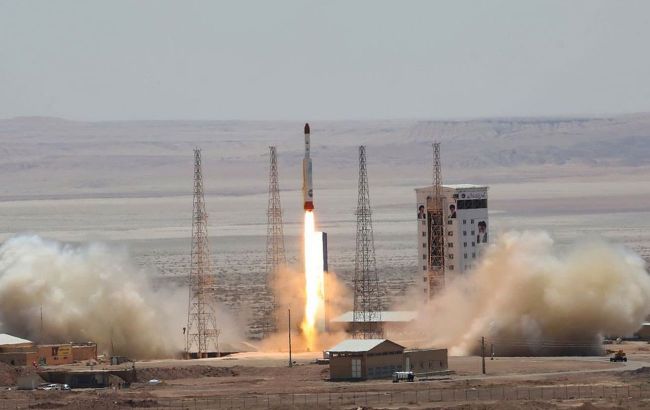IAEA passes resolution on Iran to push for nuclear negotiations - Reuters
 Launch of an Iranian rocket carrier (Illustrative photo: CSIS)
Launch of an Iranian rocket carrier (Illustrative photo: CSIS)
The Board of Governors of the International Atomic Energy Agency (IAEA) passed a resolution demanding that Iran urgently improve its cooperation with the agency and provide a comprehensive report. The document is intended to push Tehran toward renewed nuclear negotiations, reports Reuters.
The resolution was passed by the Board of Governors of the 35 member states of the United Nations (UN).
Before this, the UK, France, Germany, and the US, which proposed the resolution, called Iran's statements regarding limiting its uranium stockpiles insufficient and insincere.
According to diplomats, further actions from Tehran will determine whether the resolution will be rescinded.
Iran traditionally reacts strongly and criticizes such resolutions. Tehran has ramped up its nuclear activities and reduced oversight by the International Atomic Energy Agency (IAEA) following previous criticism from the IAEA Board.
Vote on the resolution and what it entails
During the voting on the resolution, China, Russia, and Burkina Faso opposed it. Nineteen countries voted in favor, while twelve abstained.
The resolution, reviewed by the news agency Reuters, echoed the language of the November 2022 resolution, stating that it is important and urgent for Iran to explain the traces of uranium found earlier at undeclared sites within the country and to allow the International Atomic Energy Agency (IAEA) to take samples if necessary.
Similar demands were included in a resolution passed in June this year.
In the new text, the IAEA proposed issuing a comprehensive and updated assessment on the possible presence or use of undeclared nuclear material in connection with past and present outstanding issues regarding Iran's nuclear program, including a full account of Iran's cooperation with the IAEA on these issues.
The report is expected to be provided by Tehran in the spring of 2025.
Expectations regarding the resumption of nuclear negotiations
As reported by Reuters, Western countries hope that this report will pressure Iran to begin negotiations on new restrictions on its nuclear activities with other states.
Such negotiations were halted in 2018.
However, it remains unclear whether the US administration under President Donald Trump would support the resumption of such talks aimed at establishing new nuclear restrictions.
If new restrictions are not agreed upon by then, the report could be used to strengthen arguments for the so-called snapback process under the 2015 agreement, where the matter is referred to the UN Security Council, and sanctions could either be lifted under the deal or reinstated.
IAEA expressed the desire to improve cooperation with Iran
Last week, IAEA Director General Rafael Grossi visited Tehran, hoping to persuade Iran's new president, Masoud Pezeshkian, to improve the country's cooperation with the agency.
On Tuesday, Grossi officially informed IAEA member states that the issue of whether Iran would expand its stockpile of uranium enriched to 60% U-235 was discussed during his meetings with Iranian officials.
According to Grossi, the IAEA confirmed that Iran has begun implementing preparatory measures.
Issue of Iran developing nuclear weapons
It is believed that Iran already has enough uranium enriched to approximately 90% purity, which is close to the capability needed to produce nuclear weapons.
Additionally, Iran has enough material enriched to lower levels for new bombs, but Tehran denies any intention to acquire nuclear weapons.
On Wednesday, Grossi stated that he had requested Iran to limit its stockpile of uranium enriched to 60%, and Tehran allegedly agreed to his request. The IAEA Director General called it a concrete step in the right direction. He also suggested that the resolution could undermine this progress.
Iran's reaction to the resolution
Several minutes after the voting on the resolution, Iranian state media quoted a joint statement from the Ministry of Foreign Affairs and the Atomic Energy Organization of Iran. The statement indicated that the head of Iran's nuclear industry, Mohammad Eslami, had issued orders to activate new and advanced centrifuges - machines that enrich uranium.
"If there is a resolution, it (Iran) will either increase its activities or reduce the agency's access," said a senior diplomat to Western media before the vote.
Earlier this year, IAEA Director General Rafael Grossi stated that Iran had enough uranium to manufacture several atomic warheads.
According to Western media reports, Iran possesses enough uranium reserves to create three nuclear bombs. In September last year, Iran's uranium stockpile increased by 6.7 kg, reaching a total of 128.3 kg.
For more detailed information on whether Iran can create nuclear weapons and how this can be prevented, read the article by RBC-Ukraine.

